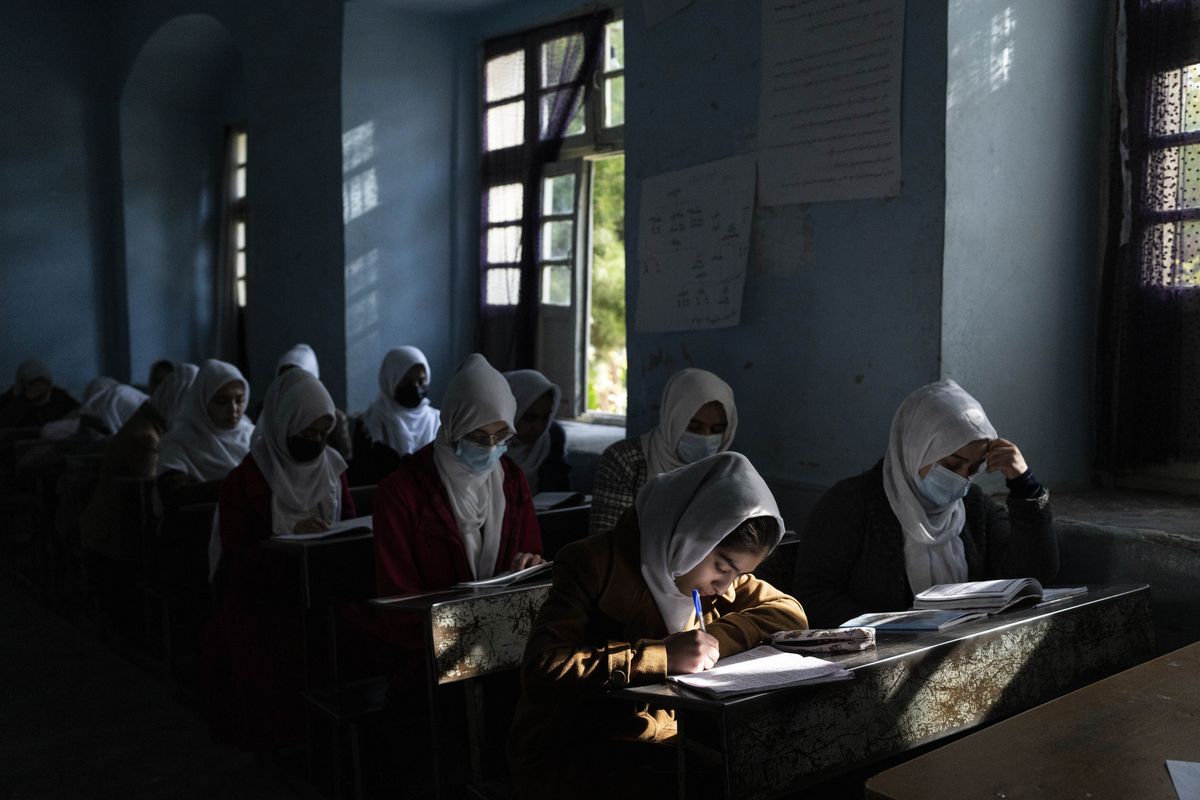Afghan girls attend a lesson at Tajrobawai Girls High School in Herat, Afghanistan on November 25, 2021.Petros Giannakouris / Associated Press
The Taliban rulers of Afghanistan unexpectedly decided to reopen the schools on Wednesday for girls over the sixth grade, renouncing a promise and deciding to reassure their hard-line base at the expense of the international community further alienation.
The surprise decision, confirmed by a Taliban official, is bound to disrupt the Taliban’s efforts to gain recognition from potential international donors at a time when the country is embroiled in a worsening humanitarian crisis. The international community has called on Taliban leaders to reopen schools and give women their right to the public sphere.
The decline was so sudden that the Ministry of Education was monitored on Wednesday, the beginning of the school year, as were schools in parts of the Afghan capital Kabul and elsewhere in the country. Some girls in higher grades are back in school, only to be told to go home.
Aid organizations said the movement has exacerbated uncertainty surrounding the future of Afghanistan as the Taliban leadership appears to be fighting to get on the same page as it is changing from fighting to governing.
It also came as the leadership in Kandahar was summoned in connection with reports of a possible cabinet shuffle.
The suffering of Afghan women is the suffering of Afghanistan itself
Why would we ever believe that the Taliban will now be more friendly with women?
US Special Representative Thomas West tweeted his “shock and deep disappointment” over the decision, calling it “a betrayal of public commitment to the Afghan people and the international community.”
He said the Taliban had made it clear that all Afghans had a right to education, adding: “For the future of the country and its relations with the international community, I would urge the Taliban to honor their commitments to their people. “
The Norwegian Refugee Council, which spends about $ 20 million a year to support primary schools in Afghanistan, is still waiting for an official word from the Taliban about the cancellation of classes for girls over the sixth grade. The NRC also offers emergency assistance, food and legal services.
Berenice Van Dan Driessche, Advocate Manager for the Council, said her representatives did not receive official word of the change as of Wednesday evening, and that girls in the 11 provinces where they work went to school but were sent home.
The committee’s staff in the provinces “reported a lot of disappointment and also a lot of uncertainty” about the future, she said. They said that in some areas, teachers have said they will continue to hold classes for girls until the Taliban issue an official order.
Waheedullah Hashmi, external relations and donor representative with the Taliban-led administration, told the Associated Press that the decision was made on Tuesday night.
“We are not saying they will be closed forever,” Hashmi added.
UN Special Representative Deborah Lyons will try to meet with the Taliban on Thursday to ask them to carry out their decision, UN spokesman Stéphane Dujarric said.
Earlier in the week, a statement from the Ministry of Education urged “all students” to return when classes resume on Wednesday.
On Tuesday, Mawlvi Aziz spokesman Aziz Ahmad Rayan told the Associated Press that all girls should be allowed back into school, although the Taliban administration would not insist on areas where parents are opposed or where ‘Schools can not be separated.
He was reluctant to give details, but promised if schools could meet these conditions, “it would be no problem for them” to start classes for girls in the higher grades.
“In principle, there is no issue on the part of the ministry, but as I said, it is a sensitive and cultural issue,” he added.
The decision to post the return of girls to higher levels seems to be a concession to the rural and deep pillars of the hard-line Taliban movement, which in many parts of the country is reluctant to send their girls to school.
The decision also came as the leadership of the movement in southern Kandahar was summoned by outraged Taliban leader Haibatullah Akhunzada, reporting on a cabinet reshuffle, according to an Afghan leader who is also a member of the Leadership Council. He spoke on condition of anonymity because he was not authorized to speak to the media.
Officials said it was possible some senior interim cabinet positions could be changed.
Since the Taliban came to power in August 2021, there have been persistent reports of differences between senior leadership. According to these reports, harder-line members are at odds with pragmatists who want to see greater engagement with the world. While remaining true to their Islamic faith, they want to be less harsh than when they last ruled Afghanistan, banning women from work and girls from schools, reports say.
Television is allowed in Afghanistan today, unlike in the past, and women are not required to wear the all-encompassing burka. but must wear the traditional Hijab, the head covering. The women are also returning to work at the Ministry of Health and Education and at Kabul International Airport during passport control and customs.
The Taliban were ousted in 2001 by a US-led coalition to retain al-Qaida leader Osama bin Laden and return to power following the chaotic departure from the United States last year.
The girls have been expelled from school since the return of the Taliban over the sixth school year in most parts of the country. Universities opened earlier this year in much of the country, but since the takeover, Taliban edicts have been irregular. While a handful of provinces offer all further education, most provinces have closed educational institutions for girls and women.
In the capital of Kabul, private schools and universities have been operating continuously.
The religiously driven Taliban administration fears continuing to enroll girls over the sixth grade could alienate their rural base, Hashmi said.
“The management did not decide when and how they would allow the girls to return to school,” he said. While he assumed that urban centers mostly supported education for girls, much of rural Afghanistan was opposed, especially in Pashtun tribal regions.
In some rural areas, a brother will fire a city-dwelling brother who allows a daughter to go to school, Hashmi said, adding that the Taliban leadership is trying to decide how to educate girls over the sixth grade in total. Land opens.
Most Taliban are ethnic Pashtuns. In their sister run through the country last year, other ethnic groups such as Uzbeks and Tajiks in northern Afghanistan either joined the fight with them or simply did not oppose it.
“We have done everything the Taliban have asked for in terms of Islamic clothing, and they have promised that girls will be able to go to school and now they have broken their promise,” said Mariam Naheebi, a journalist working with the AP spoke in Kabul.
“They have not been honest with us,” added Naheebi, who was protesting for women’s rights.
Our morning update and evening update newsletters are written by the Globe editors, giving you a concise summary of the most important headlines of the day. Sign up today.


Add Comment